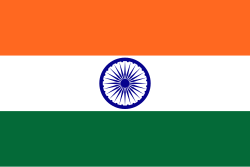| India at the 1974 British Commonwealth Games | |
|---|---|
 | |
| CGF code | IND |
| CGA | Indian Olympic Association |
| Website | olympic |
| in Christchurch, New Zealand | |
| Flag bearers | Opening: Closing: |
| Medals Ranked 6th |
|
| British Commonwealth Games appearances | |
This was the seventh time India participated in the Commonwealth Games [1] India ranked 6th in the medal tally. [2]